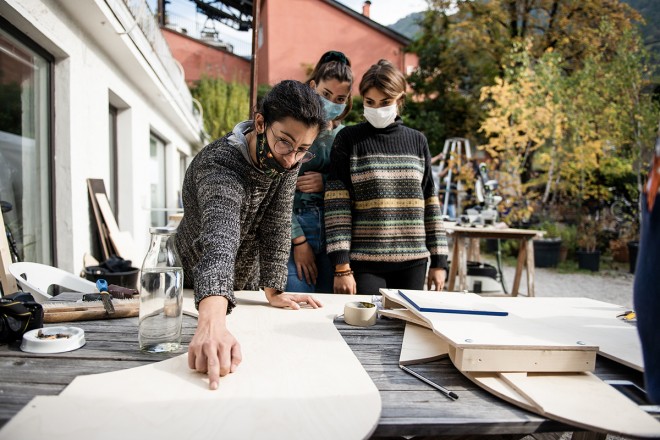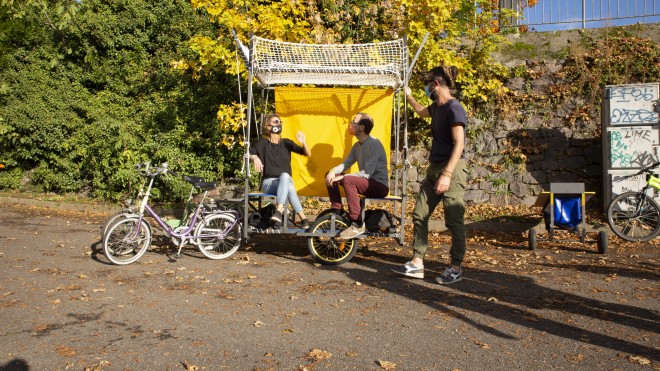Symbolic Actions for our Present
A research project aimed at updating two terms: “monument” and “living together”
The project entitled “Symbolic Actions for our Present Time” is a series of lectures, discussions, texts, and actions that call for an alternative view of the contemporary and social relevance of a monument—as a thinking space and a place for action—and to activate raised awareness for the symbolism of our present time. It isn’t just about seeing the many different perspectives, history and memory as intrinsic constants of our age, but also about the possibility of imparting sustained expression to our thoughts and actions, which are rooted in our contemporary world. The city of Bolzano and the region of South Tyrol are the places of action and the points of departure: the coexistence and interaction of different individuals is their key characteristic and also a development opportunity for the future. The project seeks to link the two terms “monument” and “living together”, update them, and expand on them; through this process, the project will be developed with a research and a joint action between the invited artists and designers and the curators of the project.
“Symbolic Actions for our Present Time” is an initiative of the project-space Lungomare. The project is divided into two interlocking, overlapping phases: research, and a series of actions within the public space of the city of Bolzano. This open and applied research begins with a research week at the end of October 2010. The research will continue to be further developed throughout the life of the project and documented on the website symbolicactionsforourpresent.lungomare.org. The online glossary summarises important basic concepts, creates connections, and places viewpoints in opposition to one another. The Brave New Alps artists’ collective, the artists Jacopo Candotti and Helmut Heiss, the architects Eva Mair and Katherina Putzer, and the designer Maja Malina are developing the project together with the curators and will follow-up with a partial result in 2011—an action and initiative for the public space of the city of Bolzano.
Lungomare, public space of Bolzano, Artissima Lido Turin
The project will commence with a research week that will be held between October 25th and 30th, 2010. A total of 36 people—including historians, journalists, philosophers, curators, architects, artists, designers, writers, political scientists, and sociologists—will conduct a week-long research session at the Lungomare offices: the objective will be to observe the thematic starting point of the project from a broad perspective. The exchange of ideas and opinions worked out over the course of the week will provide the point of departure for a joint action and campaign carried out in the public spaces of the city by seven designers and artists throughout the course of the year 2011. The question remains open whether this action and campaign will in fact result in a monument or whether the concept of a monument will be demarcated in such a way that this project cannot be defined as such.
During the preliminary and execution phases, the research project develops further and—following the initial input as part of the research week—takes the concrete form of a glossary on the website of the research project the research develops. The glossary will be a compilation of all the important terms that come up over the course of the debate, create links and distinctions between them, and put forth opposing opinions.
The project Jederland engages with the issues of property and possession and how the resulting power structures shape the way we live together. Jederland’s objective is to free a piece of land from its status of possession in order to withdraw it from the dynamics of power it is usually subjected to. We want to create a vacuum in the urban fabric in which rigid conventions and systems are suspended, a space of imagination where new modes of living together can be developed. The land, physically located in the urban space of Bolzano, should on the one hand prompt a questioning of the limits of current property laws, and on the other hand represents a lever for a broad discussion on property, possession, community and common goods. Considering the ever-present territorial conflicts, our willingness to rethink these concepts is taking on a crucial role.
Within Winter 2011 “Jederland” will be realised by means of a real estate in the urban space of Bolzano. “Jederland” is a collaborative project between Brave New Alps, Helmut Heiss, Eva Mair, Maja Malina, and Katherina Putzer, the curators of the project are Angelika Burtscher and Daniele Lupo.
More here: www.symbolicactionsforourpresent.lungomare.org (German and Italian)
The blog, entitled “Elective Neighborhoods”, starts from an independent point of view and explores the central theme of urban identity: living. The residential community, as a special, cooperative form of life becomes the object of research: it is a tangible and social space—in small as well as large cities— that goes beyond family, in which the private sphere is shared with others. What we call “Elective Neighborhoods” already exists as local networks in which people help each other to solve specific tasks that are part of a common area of interest. More than ever, students, employees and sometimes several couples or families create living units with very different compositions. These living unites reflect the society of our time, and are a typical development of urban life. The Elective Neighborhoods blog will investigate the various forms, motives, types of communities, feeling of community, and spatial arrangements that form part of communal life in Bolzano. Visits to Bolzano’s various residential communities lead to moments in which their inhabitants reflect their constitution.
Here the blog: http://vicinatoelettivo.org/lungomare/
Autonomous Region Trentino-South Tyrol
Autonomous Province of Bolzano-South Tyrol
The citycouncil of Bolzano
Stiftung Südtiroler Sparkasse
Parkhotel Laurin
What´s on
EXHIBITION :: Binta Diaw :: Collective Practices – A Living Experience of Feeling ListenedAbout Lungomare
Lungomare, a cultural association founded in Bolzano in 2003, was created from the desire and necessity to open a space in which to share differences, experiences, opinions and desires, a space in which to make the link between cultural production and the political and social dimension. Lungomare undertakes projects that investigate and test possible relationships between design, architecture, urban planning, art and theory, the results of which are presented in different formats: public discussions, conferences, publications, exhibitions and interventions in public spaces. All these formats are characterised by the intention to interact with cultural and socio-political processes relating to the region in which Lungomare is located.
Currently Lungomare’s activities focus on long-term residency projects, a format whereby Lungomare invites guests to engage and interact within the context of South Tyrol. Lungomare’s activities are based on three principles: specific attention to the context in which the association’s projects are undertaken, the transdisciplinary approach that distinguishes these projects, and reflection on the role of Lungomare as a cultural institution in connection with the region in which it operates.
Territory
Lungomare is located at the edge of Bolzano, the capital of South Tyrol, and relates to the context in which it operates, attempting to highlight the dynamics of change. Large urbanized areas alternate with broad areas of intensive cultivation and yet others of picturesque landscape, all of which penetrate the centre of the city. The city is surrounded by mountains and this is one of the reasons why the tourism industry has become a driving force in this locality. The demographic structure of the city has been characterized for a long time by the coexistence of two populations, those speaking German and those speaking Italian. However, the social and demographic composition of Alto Adige Südtirol is changing. Migrants, including those from non-European countries are making their way to the area to settle, whilst others, including political refugees, are flowing through the region.



